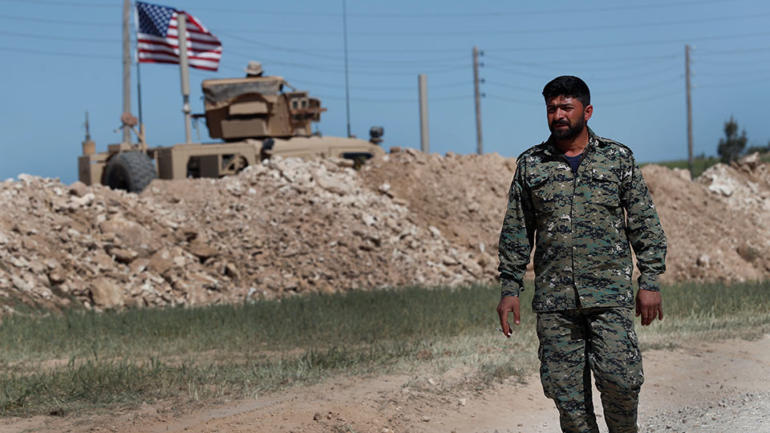Last month, U.S. President Donald Trump declared the United States was pulling about 2,000 troops out of Syria. He made the announcement without interagency coordination.
The exact wording, timeline and strategy of the withdrawal has shifted since the plan was first announced. Also unclear is the potential impact on U.S. allies, who are fighting against ISIL in Syria.
The SDF, or the Syrian Democratic Forces, has been battling alongside the U.S. since 2015, particularly in northeast Syria, to defeat ISIL. Though others are included in the makeup of the SDF, Kurds make up its core.
“When the United States withdraws from Syria, it’s going to leave the SDF in a very difficult position,” Scott Anderson, a fellow with the Brookings Institution, told CGTN.
Turkey has told the U.S. it would increase its fight against ISIL once American troops leave. Turkish President Recep Tayyip Erdogan said he sees the Kurdish militias as a terrorist threat.
“The Turkish government stands to benefit substantially if the United States were to withdraw [from Syria] and particularly if the United States were to say ‘we are handing the responsibility for the counter-ISIS mission over to Turkey,’” Anderson said.
He added, “It would give them free operational reign in northeast Syria, where the SDF and particularly the Kurdish groups that are at the core of the SDF operate. The Turkish government sees those Kurdish groups as an outgrowth of their own Kurdish PKK insurgent movement that they’ve been in more or less open conflict with off and on for the last 30 years.”
When U.S. National Security Advisor John Bolton saw the potential threat, he pushed for Turkey to promise to protect the Kurds as a condition to the U.S . pullout— something Erdogan did not accept.
“Bolton’s remarks in Israel are not acceptable. It is not possible for me to swallow this,” Erdogan said in a speech to his Parliament on Tuesday, adding, “Bolton made a serious mistake. If he thinks that way, he is in a big mistake. We will not compromise.”
Since then, U.S. President Trump has spoken out against the issue himself, tweeting the U.S. “will devastate Turkey economically if they hit Kurds. Create 20 mile safe zone….”
Starting the long overdue pullout from Syria while hitting the little remaining ISIS territorial caliphate hard, and from many directions. Will attack again from existing nearby base if it reforms. Will devastate Turkey economically if they hit Kurds. Create 20 mile safe zone….
— Donald J. Trump (@realDonaldTrump) January 13, 2019
….Likewise, do not want the Kurds to provoke Turkey. Russia, Iran and Syria have been the biggest beneficiaries of the long term U.S. policy of destroying ISIS in Syria – natural enemies. We also benefit but it is now time to bring our troops back home. Stop the ENDLESS WARS!
— Donald J. Trump (@realDonaldTrump) January 13, 2019
Turkey’s Foreign Minister Mevlut Cavusoglu responded to Trump by saying “you cannot get anywhere by threatening Turkey economically.”
The Kurds are now reportedly reaching out to Russia and the government of Syrian President Bashar al-Assad for protection.
“For the SDF, particularly for the Kurdish groups that form the core of the SDF, they view Turkey as a much greater threat—they have a more hostile relationship with Turkey,” Anderson said, adding “so many of these groups, particularly the Kurdish groups, may be more comfortable with the Assad regime than they would with the Turks.”
In the face of a U.S. troop withdrawal, several countries are angling to have influence in Syria. Besides Russia and Turkey and the allied coalition fighting ISIL in the region, Iran is also a factor.
“Whether you like it or not, Iran is an actor in Syria,” said Cavusoglu. “We need to work in a constructive manner with the present actors.”
 CGTN America
CGTN America
 FILE – In this April 4, 2018 file photo, a U.S-backed Syrian Manbij Military Council soldier passes a U.S. position near the tense front line with Turkish-backed fighters, in Manbij, north Syria. President Donald Trump’s abrupt decision to pull U.S. forces out of northeast Syria stunned the Kurds, who for the past three years have been America’s partner in fighting the Islamic State group. The U.S. needed a partner on the ground after its takeover of the eastern and northern third of Syria, and found in the Kurds an effective, organized force. The U.S. armed the Kurdish militia, along with some Syrian Arabs and Christian Assyrians, and backed them with U.S. troops and airpower. (AP Photo/Hussein Malla, File)
FILE – In this April 4, 2018 file photo, a U.S-backed Syrian Manbij Military Council soldier passes a U.S. position near the tense front line with Turkish-backed fighters, in Manbij, north Syria. President Donald Trump’s abrupt decision to pull U.S. forces out of northeast Syria stunned the Kurds, who for the past three years have been America’s partner in fighting the Islamic State group. The U.S. needed a partner on the ground after its takeover of the eastern and northern third of Syria, and found in the Kurds an effective, organized force. The U.S. armed the Kurdish militia, along with some Syrian Arabs and Christian Assyrians, and backed them with U.S. troops and airpower. (AP Photo/Hussein Malla, File)
